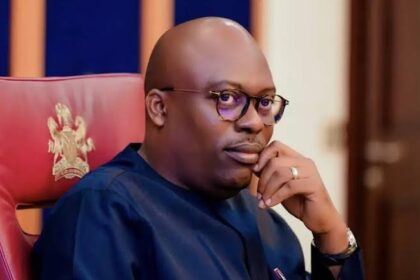The Federal Government and Attorney General of the Federation (AGF) have asked the Supreme Court to decline jurisdiction over a suit seeking its intervention in the trial of suspended Chief Justice of Nigeria (CJN), Justice Walter Onnoghen before the Code of Conduct Tribunal (CCT).
The FG and the AGF contended that Onnoghen’ trial was personal to him and could only involve the Supreme Court, where an appeal arises from the Court of Appeal on a decision reached either during or after the trial at the CCT.
Their position is contained in a notice of objection they filed against a suit instituted at the Supreme Court by Cross River State.
The state government, in their originating summons, queried the propriety of Onnoghen’s trial before the CCT and urged the Supreme Court to declare it illegal on the grounds that it was only the National Judicial Council (NJC) that could exercise disciplinary powers over a serving judge.
In their objection, the FG and AGF (listed as defendants in the suit), argued that the subject of the case did not qualify as a dispute between the Cross River State and the Federal Government, as envisaged under Section 232(1) of the Constitution.
They added: “The subject matter of this suit is personal to Hon. Justice Onnoghen Nkanu Walter Samuel and does not, in any way, affects the Cross River State Government as to confer it with the locus to institute this suit.
“The reliefs and claims made herein by the plaintiff are not for the benefit of Cross River State, but personal to Justice Onnoghen Nkanu Walter Samuel.
“The alleged cause of action in the subject matter of this suit is not one that creates the existence or extent of a legal right between the Cross River State Government, in its capacity as a state and the defendants in this suit as stated under Section 232(1) of the Constitution.
“The Honourable Justice Onnoghen Nkanu Walter Samuel, being an indigene of Cross River State and the highest judicial officer from the state does not confer on the plaintiff the locus to institute this suit.
“The fact that the suit partly relates to the interpretation of the Constitution does not confer on the plaintiff the locus to invoke the original jurisdiction of this honourable court.”
The plaintiff, in their originating summons, want the court to among others, declare that, by the provisions of sections 4, 5, and 6 of the Constitution, there a clear recognition of the doctrine of separation of powers and checks and balances in relation to the operations of the three arms of government.
The Cross River State wants the court to declare that, by virtue of the provisions of sections 153(1), 158(1(, Paragraph 21(b) of Part 1 of the Third Schedule to Constitution, it is the NJC that is exclusively empowered to recommend to the President or Governor the appointment/removal of any judicial officer.
It also seeks a declaration that the CCT, not being the NJC, is not vested with the jurisdiction over any judicial officer for an alleged official misconduct on the part of a judicial officer, without a formal complaint of such official misconduct being first made to and investigated by the NJC.
The plaintiff equally wants the Supreme Court to declare that the filing of the charge, before the CCT, against Onnoghen, being a judicial officer, without any formal complaint having been made against him to the NJC, robbed the CCT of jurisdiction to try the charge and all the proceedings relating thereto, amount to a nullity.
It, therefore, urged the court to grant an order of injunction, restraining the defendants and their agents from further initiating or proceedings with any similar charge or charges against Onnoghen or any judicial officer of the superior court created by the Constitution, until a formal report of misconduct is first, made to and investigated by the NJC.
At the Supreme Court yesterday, lawyer to the defendants, Dayo Apata (who is the Solicitor General of the Federation), told the court that his clients have just filed some processes, including a memorandum of appearance, notice of preliminary objection and a counter affidavit to the originating summons.
Apata said he was able to serve the processes on the plaintiff’s lawyer shortly before the court began sitting yesterday.
Lawyer to the plaintiff, Lucius Nwosu (SAN), acknowledged the service of the defendants’ processes on him.
Nwosu said, in view of the importance of the case, he would urge the court to grant a short adjournment to enable him respond to the defendant’s processes.
Justice Olabode Rhodes-Vivour, who presided over a seven-man panel of the court, adjourned to February 28 for the hearing of the defendants’ objection along with the substantive suit.



